#rather than them being literal unpaid servants
Text
My views of jamikali (from someone who doesnt ship it but also doesn’t judge those who do)
im at the point where I don’t like or ship jamikali because i think its toxic (that is my opinion btw, if you don’t think it is then that’s alr because opinions are not facts ^^) but also I want them to be friends. Like. I want them to work on themselves for a bit and then begin working on their friendship again. At the same time though, I don’t think I can ever see them in a romantic relationship simply because of the trauma inflicted on both ends from both ends. Even if it was unintentional, it’s there.
i accidentally went crazy in the tags so if you want more feel free to read those 😭
#I saw a tik tok talking about this ship and one of the comments said that people who are against the ship mischaracterize the two more#which confused me a bit#because I’ve seen a lot of jamikali shippers portray Kalim as a harmless cinnamon roll sunshine boy when he has much more to his character#but then I was like#tf it doesnt matter if you ship it or not#I see scarabia mischaracterized a lot#and I think it’s because the en translation left out a lot of jamils story#so it was seen more of his family willingly working for kalims#rather than them being literal unpaid servants#i think they should redo the the translation#also mischaracterizing characters although bad happens#like maybe you just got into the fandom and haven’t finished the story#or maybe you have trouble writing certain kinds of characters because you don’t personally understand how they act#and thats okay as long as you try your best#imo mischaracterization is only bad if a. the characters are completely different. B. things from the character’s personality or story are#emoved by choice#(fuck you tag limit)#or C. The person is informed of mischaracterizing someone and proceeds to ignore it#if it’s someone who may be new to writing or the fandom or someone who is maybe just misinformed then I feel like you can just tell them#hey ! I see you may be mischaracterizing this person a bit#let me inform you how and what you can do better#(nicely)#twisted wonderland#twst#jamil viper#disney twisted wonderland#twst wonderland#kalim al asim#opinion#went crazy in the tags whoops
6 notes
·
View notes
Text
Tolria, Home of Houses
In the land of Tolria, there resides six ancient noble houses owned by the high elven race. These houses are at constant turmoil with one another over the land, which is imbued with a surplus of magic. Each controls their surrounding lands and have very different cultures to their names. These estates include the Drestars, the Noremads, the Maritons, the Wrhythres’, the Opretons, and the Faloque.
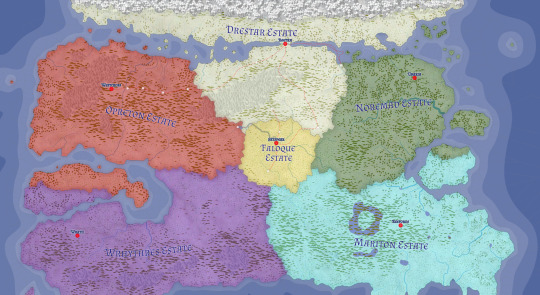
The Drestar are the northernmost house, making their home within the valleys beneath the Balar Mountains which divides the land of Tolria from the Northern Wastes. They are a mercantile people who have built an empire based around trade with the other nations. As such, they have easily become the most powerful and secure house among the six, as no other estate risks losing their lucrative deals within the trade capital of Tolria; Regyrn, The City Made of Gold. Many generations ago, Drestar was not called Drestar, but instead Balar. It was the only estate not ran by elves, instead being owned by the dwarves who made the northern mounatins their home. However, the entire land was lost in a card game by the Dwarven king, Darruk Balar, to an elven gambler named Xerseine Drestar I. It's been claimed by the dwarves that this game was rigged or cheated, or even that their lands were stolen by the elves, but as of yet nothing has come of their claims. In fairness, in recent years the northern dwarves have been awarded much more autonomy from the house, but are still often monitored in case of a sense of rebellion. This estate is the youngest of the six houses, however it is arguable that it is the most powerful of them all. Drestar is the most populous and richest estate, and second largest in land size, only behind their western neighbors, the Opreton.
The Opreton to the west are a violent and staunch people, who live their life in search of conquest on the battlefield. They reside within rocky highlands, with very little in the way of natural resources. This has led to a culture of antagonism and glory-seeking, as Opreton warriors claim victories for their Chiefland. Within this land, magic has been outlawed, with the use of such abilities resulting in being hunted down and slain by the Chieftain's Magi-Hunters and Magi-Slayers, respectively. They also engage in alternatives to gold within their land, allowing body parts to be bartered with the same legality as normal tender. All of these factors have led to those outside of Opreton to see them as nothing but mindless savages, but in reality they are a proud people with a drive to prove themselves as worthy to their homeland. Sadly, however, perhaps the most savage action they partake in is a thriving slave economy, where many who fail in the arenas are taken and sold to be forceful servants, if they are not already. Many of these captures are taken away from their homes and families, and most are sent to their southern neighbors, the Whythres.
The House of Whythres is an oddity amongst the rest of the continent, as it is the only house which is not ran solely by a single ruler. Instead, it is divided into many smaller estates, who all collectively together make up the United Lordships of Whythres. Each Lord controls their surrounding lands as they see fit, and they swear fealty only to the High Lord, a title which holds more weight as a cultural icon rather than a diplomatic title. Within this land, demons and devils run rampant, both in a metaphorical and literal sense. This land is home to an extensive cave system which snakes its way down all the way into the Deepdwell, where devils reside, curious and hungry. Meanwhile, above ground, many of the elven estates of Whythres heavily engage in the practice of slavery, whether for plowing fields, acting as unpaid servants, or even tending to their shops and restaurants which can be found in the estate-cities, which are exactly what it sounds like. These slaves often wear magic collars as well, which dampen their emotions to be more open to persuasion. A truly horrifying and sickening system, which has gained much public scrutiny by the other houses. Whythres is divided into three very distinct ecosystems: The Crownwatch to the west, the Plowlands in the center, and the Infernal Sands to the east, which is an expansive and deadly desert which divides Whythres by land from their neighbors: The Opreton, Faloque, and Mariton.
The Faloque are a sadly desperate house, who have fallen from their previous glory generations ago. Once they ruled nearly the whole of the continent of Tolria, from the rugged western highlands to the southern marshes. The Faloque Empire ruled with strength and power, quelling any upsets and eliminating voices that spoke against its sovereignty. It was both mighty and terrible. However, over time the stagnant armies of Faloque began to falter, as many different cultures began to rebel in stronger numbers. As Faloque's empire crumbled, it is said the last of the emperors flung himself from the peak of the castle of Skyspear to the stone road below. Nowadays, the flat central plains of Tolria is used most as a staging ground for the other, larger forces of the continent to battle upon. A land once full of power, reduced to nothing but someone else's battleground. As such, much of its people are displaced and impoverished, struggling to find ways to live day by day. Many decide to flee Faloque entirely, heading to more prosperous nations such as Drestar or Mariton, who welcome such refugees more openly than the other houses.
The Mariton are obsessed with understanding the world as it could be, curious as to the secrets it may be holding. The house is home to an organization called the Third Shield Society, which heads many aspects of the estate, but are most well known for the Third Shield College, which is the home of many an aspiring scholar. Both in magic and in science, Mariton excels, oftentimes blending the two together to push them both to their theoretical extremes. As such, their culture is one of advancement, always focused on the next big invention which may revolutionize the world. Many of Mariton's inhabitants have upgraded their physical bodies with the advent of technology, and there are even great strides made to create fully autonomous beings of metal and electricity, the likes of which have never been seen before in this world. However, oftentimes their pursuit of ingenuity leads them down dark paths, requiring engaging in sacrilegious acts in order to get the job done. Along with that, outside city walls the house's lands can be quite dangerous to the ill-prepared, as many bandits and thugs wander the roadways of the wetlands of Mariton in search of some coin and perhaps scrap that a foolish architect might mistake for valuable artifacts.
Lastly, the Noremad are the most reclusive and mysterious of all the six houses. They largely keep to themselves and tend not to involve themselves in house drama. Within their borders, they practice the magic of the land, however often to the land's detriment. Long ago, the first Druid-King of Noremad travelled into the Diani Ocean and discovered lands known as the Isles of Druno. There, he discovered plants and animals he had never seen before and became enamored by its beauty. He decided he would return back home to Tolria and spread the joy of this discovery to his people and the land. So, using ancient magic and a powerful artifact, he began to teraform the natural land of the Northeast into a jungle. He passed down his methods to many, and over time the land of Noremad has been transformed completely from what was once a forest haven into an artificial rainforest, with thousands of druids all maintaining it around the clock. This has drastically shifted the climate of the entire continent, and possibly the world, as more and more moisture is needed in order to maintain such a large elf-made ecosystem. Noremad is also very bureaucratic land, however, as they are staunch believers in order and law, a remnant of their culture left over from before the first Druid-King. As such, the land is a strange mix of both wild nature and ordered society which coexist to create a corrupt land, both in habitat and culture, with gilding vines hiding its true nature.
Currently, the 6 houses live in a tenuous peace, with many treaties and pacts made between the estates. However, the tense nature of estate relations could come crumbling apart at any moment, and all it would take is one wrong step to destroy the peace and cause yet another war of the houses.
#d&d#d&d podcast#worldbuilding#storytelling#writing#oc#young misadventurers#tolria#d&d homebrew#d&d campaign#podcast#ymdnd#d&d world
3 notes
·
View notes
Note
Oh boy that anon was strawmanning so hard. I've never seen anyone in Dany-critical/Anti Dany/Anti Targ fandom defending slavery or slavers. Usually it's Dany stans who in order to excuse her every behavior constantly ends up defending slavery: She had slaves "Well they were gifted to her, what was she supposed to do? Turn them down, not use them??!" She had no moral objections to being waited on hand and foot by slaves in Qarth "Well what can she do? Refuse being serviced?" She bought a slave army and used it to sack a city "Well but she later freed them!! Sure it's established that they would never betray their master even for freedom because they had been abducted as a child to be turned into brainwashed mindless killers and they have no one in their life and no other skillset besides soldiering but ThEy StIiL cHoSe HeR" She uses forced manual labour in Meereen "She needs things to be done OK, who is gonna do that? She may not be paying them with money but she still provides food and shelter, that's a form of payment, isn't it?!!" She actively profits from slavery like as in literally making money from slaves being sold "Well they wanted to sell themselves back into slavery, should she have refused it? And she is taxing the slavers in order to discourage it, and the money she gets well she probably will use it for the people, right? It's not like she'll be using it for her Iron Throne campaign." Irri and Jhiqui still see her as their master, Irri refers to their sexual encounters as her duty to her Khaleesi, they call Missandei her slave "Well what do they know? Of course Missandei is not her slave, Dany said so herself, she freed them. They just don't understand. We should trust Dany's judgement on slavery rather than her former slaves current unpaid servants."
People criticizing Daenerys and her actions doesn't mean "defending literal slavers" just because some of the people killed happens to be slavers. Painting someone like Daenerys, a slaver herself and someone very proud of her slaver ancestors, as an abolitionist leader to look up to is what is disgusting.
LOL yes exactly, like why in the fuck would anyone defend slavers to drag Dany when she is a slaver? As far as single people in the world who have benefited from slavery, she’s at or near the top of the list, each individual slaver she’s encountered and killed has not benefited from slavery as much as she has. But to be honest at least the Dany stans I have encountered (which I don’t doubt are the most extreme of the fandom) have an extremely un-nuanced grasp of her character or the critiques against her.
90 notes
·
View notes
Note
I was hoping you would be able to help me form a response when my family says they're sick of hearing of systemic racism and white privilege because THEY have had to work for everything and believe nothing got handed to them (true in the way they're thinking, but you know what I mean).
Welp. First, I applaud you for taking the initiative to engage in difficult conversations with your family, since the only way embedded racist ideas are going to get confronted in white society is if racist white people hear it from their friends and family. They are going to cheerily ignore protestors, academics, newsreaders, popular culture, and certainly politicians who say anything to the contrary, but it’s harder to ignore and brush aside when it’s coming from people who are directly within your own family group. They can still then ignore it, but at least you’re trying to do something that is not at all fun but which is deeply necessary, and good for you.
First, there are a few things for you to consider. Is this a case where they actually don’t know the difference, but are willing to learn, or is this essentially sealioning (where they act like they don’t know the difference, but they absolutely do, and put the emotional labor on you to extensively define and explain and educate while never intending to change their stances on anything). If it’s the former, then there is some point in engaging in dialogue with them. If it’s the latter, it’s a giant emotional trap that you are within your rights not to engage with until they signal that they’re willing to engage productively. You don’t have to educate someone who is categorically unwilling to be educated (especially when it’s often deliberate ignorance). As people like to say, Google is free, and it’s their responsibility to take the first steps to change. You can continue to talk with them, but yes, that is contingent on them actually standing a chance of listening to you and not just you wearing yourself out on something that they don’t want to actually hear (because it threatens them and makes them feel Personally Wrong, and white people don’t like that).
There have been various books written on why it’s so hard to talk to white people about racism, which you may be interested in checking out, not least the book "Why I’m No Longer Talking to White People About Race” by Renni Eddo-Lodge. Ibram X. Kendi has also written “How to Be An Antiracist,” one of the bestselling books of this summer, either of which would be useful either in shaping your own arguments or (if they’re receptive) giving to your family. Once again, this is contingent on them signalling that they’re actually willing to listen, and not just to make you do pointless emotional labor. These books are probably available from your public library (though there’s probably a waitlist) or in other easily available formats.
Next, it’s a basic tenet of an anti-racist education that white people have never had to do this kind of reckoning, and thus get whiny, defensive, guilt-tripping, and “it’s not about ME I’m a GOOD PERSON” when it comes up. This also rests on the damaging and deeply intertwined effects of racism and classism, which has to be understood if you’re going to talk about it. One of the greatest tricks that racist capitalism ever pulled is convincing poor white people that they had more in common with their filthy rich white masters (people whose way of life will never in a thousand years be anything like each other’s) simply because they shared the inherent racial “purity” of being white. There have been political studies written on how poor/undereducated/working class white people have become such a reliably Republican constituency, because they have been successfully manipulated to believe that the white overlords are their “people” and they will constantly vote against their own economic, social, and cultural interests in favor of enriching amoral white demagogues who beat the populist xenophobic drum. Then they blame black and brown people for society’s ills and for the reason that they stay poor, rather than the rampaging oligarchs awarding themselves massive tax breaks and billion-dollar bailouts and refusing to extend unemployment benefits in case people “make too much money” from not working, just to name the most recent example. They are so poisoned on populist politics and white supremacy, which assures them that they’re better than anyone else by virtue of being white, that they actively attack politicians and policy platforms and other social welfare initiatives that would materially improve their own lives as “un-American.” This is maddening and sometimes baffling, but it’s how it works. Whiteness trumps all, currently literally thanks to the Orange Fuhrer. Problems in life are the fault of the Other.
This isn’t to say that poor white people are “dumb” and just unable to realize it, because they’re caught in a system that has done this literally from the start of America. In the early 17th century, indentured laborers and slaves in the American colonies were in fact more likely to be white. (The word “slave” comes from “Slav,” since that was the predominant ethnicity of slaves in medieval Europe; i.e. white eastern Europeans.) But even despite the fact that they were unpaid laborers, they were still white and thus recognized as human by their white masters, and thus when slave ships began arriving, it was easier for everybody to simply outright demonize and dehumanize the black African slaves. The poor white indentured servants got to feel better than the black slaves simply for the fact of their whiteness. Their lives obviously sucked, but their whiteness was in fact a mitigating factor in the suckiness that it involved once it was easier to use “animalistic” black people. And we wonder why America can’t ever confront its racist history properly. As Kendi calls it in his other book, it is stamped from the beginning.
As it has been put before, white people can and often do have difficult lives, because late-stage capitalism devours its workers no matter what color they are, but their whiteness isn’t a factor in why their lives are difficult. They will never encounter racial prejudice, race-based hate crime, discrimination for housing, education, employment, bank loans, daily microaggressions and identity erasure, constantly racist tropes in the media, politicians fingering them as everything wrong with America/the world, casual prejudices or assumptions even from close friends, assumed criminality based just on their race -- etc etc. The list goes on and on. Just because you have a hardscrabble economic background does not mean that your life has been made harder by your race -- because if you’re white, it hasn’t. (And as noted, poor white people have consistently voted for megalomaniac white men who don’t give a shit about them but promise them that everything is fine or should be better for them because of their whiteness, and then blame minorities for being the source of their problems.)
I honestly wonder if racism would still be such a problem in America if we had a remotely more equitable economic system, because when you’re well off and have your basic needs consistently met and don’t need to worry that you’re one paycheck away from disaster, it’s harder to constantly be paranoid that your differently colored neighbors are stealing everything from you and the cause of all society’s ills. The historian Patrick Hyder Patterson wrote a very interesting book on material culture in Yugoslavia in the 20th century, where he basically argued that despite the spectacular collapse of the federation into the Yugoslavian wars of the 90s, things didn’t really go to hell until after the economy crashed following Josip Broz Tito’s death in 1980. While there were obviously ethnic fault lines and conflicts between Serbs, Croats, Montenegrins, Bosniaks, Albanians, etc, when there wasn’t any money and any jobs and everyone thought everyone else was to blame, THAT is when the whole thing blew up into a genocidal civil war clusterfuck. Food for thought.
This is why people talk about economic justice and racial justice as going hand in hand. When there is a scarcity of resources and no social safety net, people are obviously more inclined to look for scapegoats and to blame someone for taking their entitlement (while still somehow refusing to blame the billionaires and corporate oligarch who are ACTUALLY stealing from them). They indeed actively resist any attempts to make their own lives better as being “socialist” or “un-American” and take pride in the fact that there’s absolutely jacksquat nothing (until of course, something like the coronavirus pandemic hits and it’s revealed just how many of us were always one missed paycheck away from disaster). Then when they need government assistance (while disdaining the government as tyrannical the rest of the time, unless it’s Trump’s actively tyrannical lot, but hey, we don’t have time to unpack all that) it’s still shameful and something they shouldn’t be using, instead of their basic entitlement to a decent life.
This country is poisoned on a lot of toxic beliefs, but this is one of the deepest-running one, and which will always get in the way of poor white people dealing with racism: their lives suck, but they have ALWAYS been told that despite that, they’re still better just for being white, which is their consolation prize for supporting white populists who actively rob them, and they haven’t even always consciously registered that. They just feel that if they’re “fine,” even if they’re not fine, then black people are just malcontents and criminals who can’t hack it. In 2016, there was a lot of ink spilled over how poor white people felt a sense of economic grievance and being left behind, which was why they voted for Trump, but... Trump was never going to do a damn thing about that??? He doesn’t actually do anything for his supporters except feed them his jingoistic Orange Nazi stump speeches. They voted for Trump to feel vindicated, not to actually improve their lives, and it’s damn clear by now that not only has he NOT improved their lives, he has no desire to do so. He just wants them to cheer for him and feed his ego, not fix any problems.
Basically, racism and capitalism and the American political system intersect in multiple deeply toxic ways to do precisely what you’re talking about; producing poor white people who feel that they shouldn’t be included in the reckoning with racism because if THEY worked hard and they don’t live in a mansion, somehow racism is fake and black people should just shut up and get a job etc etc. This is because poor white people have been systematically conditioned to support white supremacy at the direct expense of their own economic and social interests; it’s terrible, but that’s how it functions. They will never in a million years have anything in common with the (white) ruling class, but they still instinctively identify with them rather than people in their own deprived economic class who are different races or colors or religions. That is how white supremacy has supported the hyper-inequality of the industrial age, and vice verse, and it is one of capitalism’s best functions for survival, so it’s in the interests of the overlords to maintain it. Stop the workers from recognizing pan-racial solidarity based on economic grievance, and compete with each other and blame each other rather than the overarching system, easy!
Anyway. Once again, this is long. But in short, the attitudes your family are exemplifying are a direct result of both racism and classism as they have been deliberately cultivated in the American social and political system, and the interlocking causes and symptoms of both have to be recognized (and acknowledged) before they can get to dealing with that. I don’t know how that will go, and I don’t have an easy shortcut. But I’m glad you’re trying. Good luck.
35 notes
·
View notes
Text
A Goofy Movie Meta: On Pete and Goofy’s Parenting Styles
A Goofy Movie has always been one of my favorites, and when I rewatched it for its 25th anniversary, I realized the themes it explores, namely that of parenting via authoritarian harshness and parenting via respectful love, are actually a lot deeper than people give it credit for. This is shown in the contrast between the way Pete raises PJ and Goofy raises Max. The gist of it is that Pete is an asshole who takes an almost militaristic approach to parenting while Goofy is a loving, caring person who takes a respectful, do-what’s-best-for-them-but-always-with-love kind of approach. A parent like Pete sees kids as servants while a parent like Goofy sees kids as people. Here’s how we see that play out:
First of all, we see very early on that PJ is TERRIFIED of his dad. Like, absolutely scared to death. As they’re setting up for the show at school, he mentions multiple times that if his dad finds out, he’s in trouble. Specifically, he says:

He also says: “If my dad finds out, he’s gonna nuke my entire existence.” And then when the prank is done, he says “My dad is gonna squash me like a bug.” Notice how Max isn’t afraid of getting in trouble with his dad at all. Because he knows his dad loves him. PJ doesn’t have that reassurance.
After the setup of Max trying to impress Roxanne and him being embarrassed by his dad, we cut to the scene of Goofy and Pete at work. Pete’s saying that he and PJ are going camping and Goofy says Max would never go for that. And Pete says:
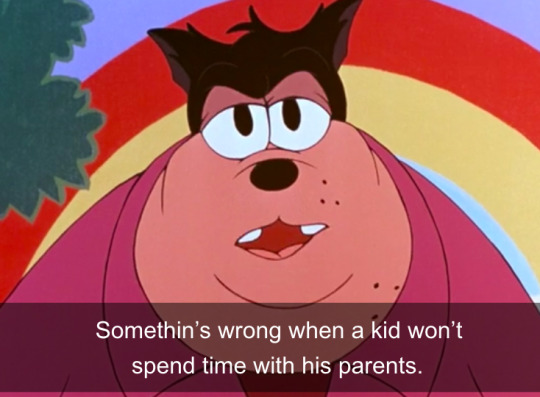
Note that Goofy didn’t say Max wouldn’t spend time with him. He only said that Max didn’t like camping. But to Pete, that doesn’t matter. What this sets up, and what becomes MUCH more evident later, is that Pete thinks of kids like unpaid servants who should do everything their parents want without a word of complaint. At least, that’s what good kids do, and any kid who doesn’t must be a bad kid. He’s one of those parents who thinks respect = obedience. Max isn’t wanting to do something Goofy wants, therefore there must be something wrong with Max and he must be a bad kid. (The funny thing is that clearly Pete’s style of parenting doesn’t actually work, considering PJ has also gotten in trouble at school. So there’s that.)
Pete immediately starts suggesting that Max must be a gang member who’s stealing stuff and causing riots. Which...again, bit much when you consider that Goofy only said he didn’t like camping. But it makes perfect sense when you consider Pete’s worldview. And since Max has never been a troublemaker, Goofy of course brushes it off and says Max would never do that. The thing to remember here is that Goofy does not like Pete’s view and does not want to resort to that if there’s another option.
But then Max does get in trouble. And Goofy hears that he’s “dressed like a gang member” and “caused the entire student body to break into a riotous frenzy,” just like Pete was saying. At first he tries to deny it, but it’s a lot harder to brush off the principal than Pete. This scene is really something to watch. The lighting gets darker, Goofy starts breathing heavily, the colors fade...it’s heartbreaking. It’s an earth-shattering betrayal for Goofy because he cannot fathom this.

He says “What am I gonna do?” because he really doesn’t know what to do. The last thing he wants is to become like Pete. So he gets the idea to go fishing. Maybe they just need to spend some time together. They can work it out like two people who love each other, can’t they? Of course they can.
But then Max doesn’t want to go, even after Goofy has exhausted every tactic he knows, so he has to resort to Pete’s way of using force by literally picking him up and putting him in the car. He’s willing to do this when he sees no other option, but it’s never his first choice.
The next time we see the four of them together, it’s in the woods after Lester’s Possum Park. One thing I noticed here is that Pete seems really cheerful...until Max asks if PJ is there. RIGHT AWAY his mood dampens. It’s hard for me to capture, but if you watch the scene, I promise it’s there. The man has zero interest in his own kid. He then says, “Oh yeah, I’m sure he’s loafin’ around here somewhere.” Which is a really odd choice of words, considering the very next thing we see:
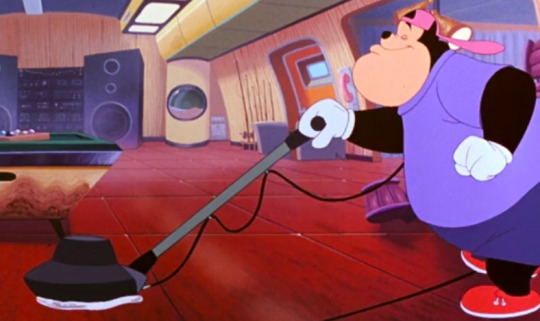
PJ is cleaning the RV and seems to be working hard at it, if a little distracted while doing so. Why did Pete say he was loafing when he’s doing chores? And why is PJ inside cleaning when Pete is coming out to enjoy the outdoors? Probably because Pete thinks that’s how it should be, that kids should act as their parents’ maids and never receive any credit for it. And this isn’t an anomaly: the next time we see PJ in the RV at the end, he’s cleaning again while Pete is the one who’s loafing:
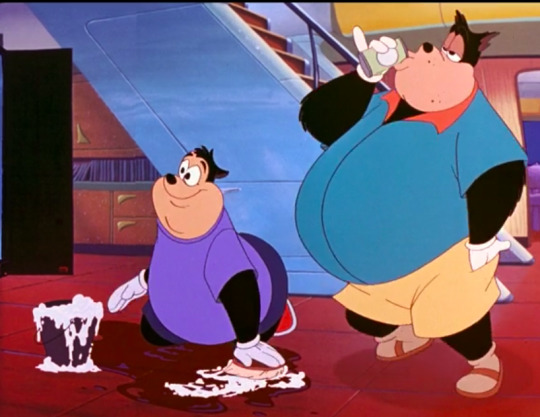
Max says that PJ is lucky to have the RV, and it’s pretty clear why PJ doesn’t say anything in agreement and immediately changes the topic to Roxanne. I imagine he probably wishes he were in Max’s shoes. Then he might actually get to enjoy the camping instead of being stuck cleaning the RV. Pete was saying earlier in the work scene that PJ had been begging him to take him camping. If that’s true, imagine how disappointed PJ must be that this was his camping experience.
And when Pete and Goofy are bowling on the roof, we get this:
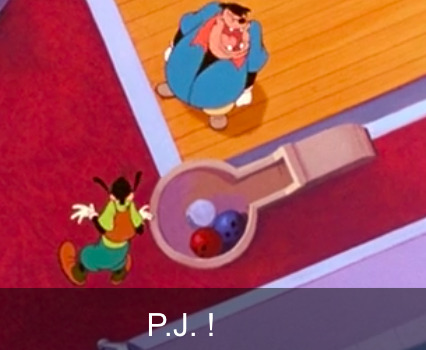
He SCREAMS for PJ so loud that everything shakes and Goofy flinches, and PJ comes running like he’s a soldier in the army, saying “Yes sir, comin’ sir, yes sir,” kicks over the pin, and then Pete pulls this really mean trick where he says “High five, son!” but then fakes it, and this is PJ’s reaction:

He doesn’t look surprised. Just sad. His dad probably does this kind of thing all the time. Because Pete sees his child as a servant that he can boss around and make fun of rather than a family member that he’s supposed to love. This is the scene where he tells Goofy that it’s all about keeping them “under your thumb.” Then he pushes Goofy to do that with Max, and Goofy does. It works, but it makes Max absolutely miserable, and Goofy sees that. Unlike Pete, he doesn’t enjoy making his kid miserable.
So the next day, Goofy entrusts Max with the map and appoints him the navigator. Since he doesn’t like being bossy, he tries to find a different approach. And he realizes that part of the reason Max is so unhappy on this trip is because he feels like he has no say in it. He doesn’t get to choose the stops, the destination, the music, any of it. As much as Goofy was looking forward to repeating the trip of his childhood, he values his son’s happiness more than his own. So he makes the sacrifice and allows Max to choose the stops from then on. That’s something Pete would never do. He believes kids do what their parents want, not the other way around.
And to Goofy’s utter delight, it works. Everything goes great. They’re happy again. Max is happy again. Sure, Goofy might not have enjoyed all of the stops he chose, but it’s still a good time. He’s willing to try something new for Max. He wants them to be friends and family who love and care about each other, not boss and servant like Pete and PJ. And now it seems like they can be. Goofy found another way. He’s thrilled.
Then they stop at the Neptune Inn (WHY is that not a hotel at Disney World??) and have a buddy-buddy moment, which is shocking to Pete:

Again, it is incomprehensible to him that a parent and child could have this kind of relationship because the only one kind he knows is the authoritarian one he uses himself. So he immediately assumes it must be an act, and that Max is pretending:

Again Goofy brushes it off like he did at work. Things are going great, after all. He has no reason to believe this is anything but real, and again, he does not like Pete’s way. They go about spending the evening together, and again we see Pete harping at PJ to do some labor without any help:
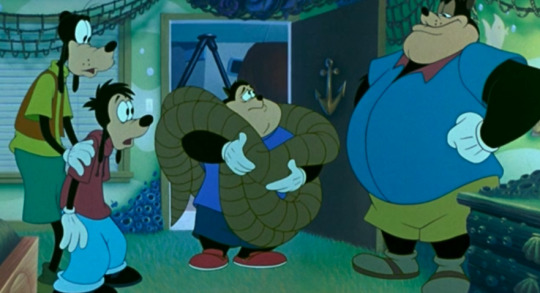
Jeez, poor kid. Even Max and Goofy look shocked at what he has to deal with. And Pete never thanks him for any of it. Why would he? PJ is nothing more than a servant, after all. He exists to serve Pete. That’s all he’s there for. And Pete is invested in this philosophy being true, which is why Goofy and Max’s buddy-buddy relationship is so off-putting, almost threatening to him.
That’s why he’s so thrilled when he overhears that Max changed the map.

Isn’t it great? Now he doesn’t have to be wrong. Now he has all the proof he needs that he was right, Max is a bad kid, he was pretending, and Goofy was wrong for thinking they could ever have a loving relationship based out of real respect where both of them have equal say and equal footing. Naturally, Pete can’t wait to tell Goofy and immediately does. In this scene, Goofy mentions that none of Pete’s techniques worked for him, which of course makes Pete unhappy.

When he breaks the news, Goofy looks just as betrayed as he did when he got the call from the principal:

And just like with the principal, he denies it. Couldn’t be, can’t be, not true. Because if it is true, then that would mean Pete is right and that a controlling way might really be the only way. That Max might actually be a bad kid. That all the joy they’ve experienced the past few days was based on a lie. So he denies it. And then we get one of the best quotes in the movie:
“You know, maybe Max isn’t all the things that you think a son should be. But he loves me.”
Maybe Max isn’t scared into submission like your son is, but he loves and cares about me. That’s enough. But of course, for Pete is isn’t, so he glares and says:
“Hey. My son respects me.”
Because for Pete, respect = obedience. PJ doesn’t actually respect him. He’s just afraid of him. And again, it’s not as if Pete’s tactics kept PJ out of trouble. He still got sent to the principal’s office just like Max did. Which is probably why Goofy responds like this:
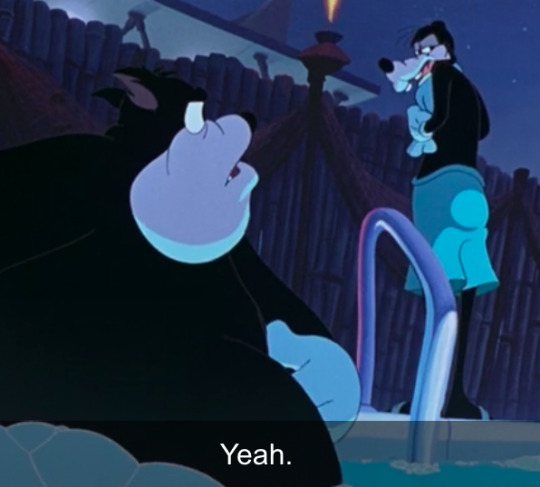
It sounds sarcastic. Goofy has seen Pete and PJ’s relationship. He’s disgusted by it. That kind of dynamic is the last thing he wants for him and Max. I like to imagine that if Pete weren’t his boss and their sons weren’t friends, Goofy might have told him off right then and there. Since Pete can’t bear to be wrong, he again yells at him to check the map. Goofy goes back and forth on whether to do so, but eventually does.
And he. Is. HEARTBROKEN.
All of his worst fears have been confirmed. He’s shocked, sad, and also tired. We see the next day that he has bags under his eyes; he didn’t sleep all night because he doesn’t know what to do.

Should he be like Pete? Even though it may not work? What’s the right way to handle this?
Max, of course, knows that something is up and has a feeling Goofy has found out but isn’t sure. They see the junction and Goofy comes up with one last idea: give Max the map and hope he’ll choose the right direction. Give him one more chance to prove that Pete is wrong, he’s a good kid, he loves and respects his dad, their good times together have been real. If he chooses Idaho, then there’s still hope and maybe the map change was a misunderstanding. If he chooses Los Angeles, then Goofy will know for sure.
So starts the tensest moment in the movie, when Goofy is all but begging Max to choose Idaho. And Max almost does it! But in the end, he chooses LA.
Goofy. Is. FURIOUS.
He’s thinking, I trusted you. I believed in you. I sacrificed making the stops I wanted to make and tried all those new things for you. I stood up to my boss for you. And you go and do this. You think I’m so stupid that I can see a sign that says “Idaho right, LA left,” go left, and still think I’m heading to Idaho. You really think I am that dumb, and you’re taking advantage of it.
Max tries to explain, but Goofy is too angry to hear it, and so Max sees this as yet another example of his dad not listening to him. And to be fair, he’s not entirely wrong. Goofy’s inability to listen is his biggest failing as a parent.
Which is why, once he finally starts listening, everything gets better. I imagine he’s relieved to learn about Roxanne, as it means there was a reason behind Max’s actions other than being a bad kid. They have their reconciliation, and when all is said and done, Max is as proud of his dad as his dad is of him. They’re finally able to have the relationship Goofy has wanted for them all along, the kind that’s based on love.
The one that, sadly, families like Pete and PJ will never have.
36 notes
·
View notes
Text
Sunday 28 August 1831
5 55/..
10 50/..
Out at 7 at which hour Fahrenheit 67˚ and fine morning – sauntered along my walk and the new Lower Brea road to Mr Samuel Washington’s – waited 10 minutes till he was ready – then walked down to look at the slopes of the Lower Brea road which I named my intention of planting – he thought the commissioners would [want] something paying for them – no! when they had walled off the road the slopes would be mine, and I was not therefore inclined to pay anything for them – he at last acknowledged they would be mine – and there being hope of the road being opened in spring, I said I would put off the planting till afterwards – next year –
Then overtook George Robinson on the road – the footpath through Well Royde wood to be set out by Washington tomorrow morning at 8 – then along the Brighouse road till turned down to Yew Trees wood – examined the quarry and went all along the bottom of the wood – the wall on both sides the lane explained as agreed upon with Thomas Pearson junior – then from our own gates went into the Cunnery wood sent 2 men out of it – home at 10 1/2 – found 4 letters on my desk – From Mr Lawton of York with bill of charges for my will £13.13.8 –
Long kind letter 3pp. and ends and top of page 1 written across from Mrs Norcliffe, Langton dated Friday 26th instant – she and Charlotte going a little ‘tour to Rokeby, Penrith by Keswick to Cockermouth, and Whitehaven, and must be back by the 19th’ - … ‘write to me if before September 6, Post office, Whitehaven’ – my boots from Rutter to be sent off as this evening – Isabella Norcliffe has paid for them – she to be off for Croft on her way to Scotland on Thursday – Hurried letter 2 widely written pp. from Mariana Lawton Friday 26th August – Charles better than she expected ‘though sadly cut up’ – .. ‘John has literally died a beggar…. the money given for Spurfield debts is gone, and the bills yet unpaid, the entire support of widow and 6 children must devolve on Charles – but the greatest of all the disappointments is that Mr Wood has lost the living, my being absent at the time has been a most unfortunate business, and I shall for the sake of others deeply and long lament it’ – thinks advantage has been taken of Charles’s state of depressed spirits to hurry him to a conclusion – William Ford has got the living for his son - … ‘we go to Leamington on Tuesday to the Royal hotel, and remain there I know not how long or how short a time’ –
Letter too 2 half sheets full, with 1 page and 2 ends of envelope from Lady Gordon, 34 Hertford Street, Friday 26th August franked by her brother-in-law Mr Frankland Lewis – ‘this letter is just like yourself, sensible, agreeable and to the purpose my affairs are still under discussion and till Monday or Tuesday next I can say nothing decidedly’! her own feeling is that she ‘must go – but not in such haste – could you be in London about the 10th or 12th September and be ready to start by land for Spain on the 14th or 15th – If I go my idea is – to take Georgiana’ ….. and leave Alice with one of her (Lady Gordon’s) sisters – ‘to remain in Spain till next spring or summer – when once I had completed my Cadiz business I should be entirely yours as to where to go, or what to do – the blessing you would be to me is not to be told etc. etc. would like me to get in London a thorough understanding of the business she is [going] that I may better know how to help her to decide – Lady Stuart de Rothesay at the lodge – has written to her to know if Miss Hobart will go abroad or not this winter, and telling Lady Stuart de Rothesay her (Lady Gordon’s) ‘possible plans’ – the reason she seemed in such a hurry to be off in her last letter was because the man going out to buy or bid for her property at Cadiz was thought to be going by the 6th of September packet – but it seems is not going till October and this gives her a month longer – the voyage will be 8 or 10 days – no preparations required but ‘mosquito nets, and a case with a few knives and forks, sheets and towels, and a glass or 2 – a black mantilla and a few yards of black silk or fine bombazeen’ – To leave all about carriages and servants till next week when she hopes ‘to write without a doubt’ ….. ‘Should you prefer going by sea and returning by land? Taking one carriage only out in the steamer? – has let her house to Mr Vaughan from the 17th September –
I must think of all this – the one carriage taken out would be mine, which would cost £30 I should suppose i.e. one half more than my own passage – say £30 and £20 and Cameron £20 and a man servant £15 and ten days living at £10.10.0 that would = £95.10.10 Take the distance from Calais by Paris and Bayonne to Cadiz at 300 postes, at 6 1/2 from per poste, and therefore suppose postage 2000 francs, suppose 30 days for the journey at 25 francs per day self and 2 servants for living = 750 francs – then I should look after things in Paris, Travel in comfort, and see a great deal of the country for 2750 francs and £10? from London to Calais = £120 or for 20, or 25 £ more than by sea – So far, good – But the chances are 10 to one we should be robbed near Madrid or before or after or both! Il faut y purser – then I must have a passport exprès, to allow me to carry about as much and whatever money I like, to make written notes, to be armed, have an escort if I demand it, and let my carriage pass the frontiers duty free –
Breakfast at 11 – Read my aunt all my letters except Lady Gordon’s, and read extracts from that
Saying Lady Gordon had business in Spain but not saying what –
Thought of staying a day or 2 longer here – Read the whole of the morning service and 1 of Mr James Knight’s [discussion] on the parables – then slept 1/2 hour and came upstairs at 1 20/.. – looking at maps and writing the above of today till 3 1/2 – then till 5 wrote 3pp. to Mariana (rather a good deal in them) and 1 page of 1/2 sheet paper to Cameron to say circumstances had occurred which would delay my leaving here for four or five days – if she had taken her place, must lose the 1/2 fare – shall hear from me again the day before I wish her to be off, but to hold herself in readiness – glad to hear from Langton very good accounts of all the family in the minster court – to apologize for my directing to her there – do not know how to direct to her at Miss Pearson’s – Tell Mariana to tell Watson to get me the stockings ordered for Madame Galvani or I must go without them – grieved more than I can tell that Mariana has so much reason to lament our tour – ‘But, Mary, who could foresee what was in the womb of time, and coming thus speedily to the birth? nor you, nor I, dreamed of what awaited us, or both had hurried home’ –
Letter from Lady Gordon this morning who cannot fix decidedly till tomorrow or Tuesday ‘that it will still be 4 or 5 days before we can make our final arrangements’ Shall be off however as soon as I can – ‘To prolong my stay much, would now be peculiarly uncomfortable to myself as well as to Marian; and at all rates, I shall make all the haste I can’ – If they stay a week at Leamington shall hope to catch them – now think of being off from here tomorrow week, but want time [cut]. Mariana to go to Liverpool and back by steam – ‘I suppose I could do this, and still be at Leamington on Tuesday week by nine or 10 at night, at latest’ – mention Mrs Norcliffe’s having heard I was going to Paris with Lady Stuart – Charles would surely not have given the living to Mr Ford’s son, had he preferred giving it to Mr Wood – ‘as there was no Lawton for it, what strikes me as most to be regretted is, that any very young man should have it – I fear I should have thought, the next incumbent ought to be 60 at least’ –
A little at my accounts – Dinner at 6 5/.. in 25 minutes for Mr Briggs waiting with my father and the rest – then had him in for 1 1/4 hour till I had thoroughly talked over all I had to say to him – about [Kerton’s] lease – not signed – desired the man to be told that if he did not sign before the 2nd of August next, he should have notice to quit – gave Mr Briggs the estimate for cellar and 2 chambers over it at Hardcastle’s £20 and £5 already paid by Mallinson and still owing to him for the drain that is made – spoke about Lower Brea mill, and the notice to Emmet about spoiling the black brook with the [canker] water from the colliery he is making – and about Benjamin Bottomley’s farm letting and the pew at Saint James’s for Whitley – and about planting the Lower Brea slopes and Godley Road ditto and about filling up Cunnery wood with 2000 oaks, and filling up Freeman’s quarry entirely with oaks and about the willow stakes to keep up the Tilley Holm and Dolt railing -
(Came to my room at 8 5/.. – Mr Briggs went at 7 55/..) Sent off at 8 10/60 by George my letter to ‘Mrs Lawton, Lawton Hall, Lawton, Cheshire’ and to ‘Mrs Cameron, Mrs Belcombe’s, Minster-Court, York’ – wrote the last 7 lines – then a little at my accounts again and went down at 10 1/4 – came back to my room at 10 1/4 – fine day – rainy evening after about 7 1/2 and windy – Fahrenheit 68˚ now at 10 1/4 p.m. -
2 notes
·
View notes
Photo
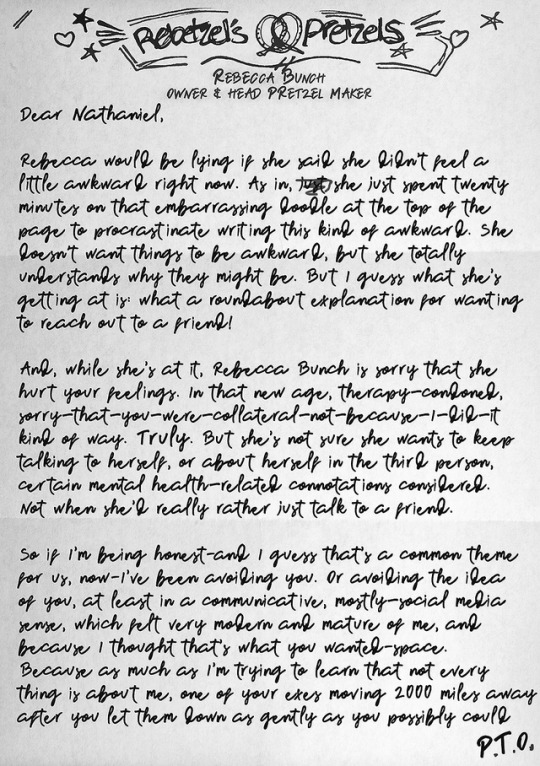


thoughts of you subside, then i get another letter
[text below the cut]
Dear Nathaniel,
Rebecca would be lying if she said she didn’t feel a little awkward right now. As in, she just spent twenty minutes on that embarrassing doodle at the top of the page to procrastinate writing this kind of awkward. She doesn't want things to be awkward, but she totally understands why they might be. But I guess what she’s getting at is: what a roundabout explanation for wanting to reach out to a friend!
And, while she’s at it, Rebecca Bunch is sorry that she hurt your feelings. In that new age, therapy-condoned, sorry-that-you-were-collateral-not-because-I-did-it kind of way. Truly. But she’s not sure she wants to keep talking to herself, or about herself in the third person, certain mental health-related connotations considered. Not when she’d really rather just talk to a friend.
So if I’m being honest—and I guess that’s a common theme for us, now—I’ve been avoiding you. Or avoiding the idea of you, at least in a communicative, mostly-social media sense, which felt very modern and mature of me, and because I thought that’s what you wanted—space. Because as much as I’m trying to learn that not every thing is about me, one of your exes moving 2000 miles away after you let them down as gently as you possibly could can’t help but feel a little personal, and liking a photo of you wearing a shade of khaki I never thought you’d be caught dead in and talking to literal monkeys felt too much like saying I was glad you were gone. Which, for the record, I AM, but only in the sense that you’re doing something for you, and you kind of look like you’re happy doing it. So, say the word, and I’ll unleash a social media storm. Likes, comments, emojis. Statuses heralding your humanitarian efforts. The whole shebang.
As for what’s going on in my life: my new roommate hasn’t tried to murder me with his bare hands yet, though I do occasionally fear for the safety of my keyboard. My singing lessons are either finally paying off or my vocal coach is just becoming immune to my opposite-of-a-siren’s-song (just as likely) and oh boy, they really aren’t lying when they say writing is HARD! But ditto on it being fun to feel challenged again in a way I haven’t in so long, and if getting something down on paper gives me even a sliver of the fulfilment I felt when you sang my words up on that stage, Nathaniel… Now that I stop to think about it, it makes it strangely appropriate, us communicating this way now, don’t you think?
Anyway, tell me everything! What are you actually doing out there in the jungle? Are there other cool animals besides monkeys? Do the monkeys live with you? Is there an alligator in your bathtub? Do you even have a bathtub? And do the monkeys have names? If not, can you call one of them Tim? I think it might help with the homesickness, personally.
For what it’s worth, and coming from someone else who was surprised to find out at some point West Covina had taken up root as that confusing, intangible concept of home—it misses you, too. But don’t feel guilty. It’ll still be here when you’re ready to come back. I can say that from experience.
Hope you’re well, and not dying from dysentery, or malaria, or whatever disease one can contract from monkeys,
Your humble and obedient servant,
R. Bunch
PS. You have NO idea how much I have always wanted a pen pal!! To be fair, I always imagined something slightly more exotic than a white overprivileged lawyer on sabbatical in Guatemala, but I guess in a pinch, you’ll do.
PPS. In the interest of expectation management, I should probably disclose that there’s a good chance I will be a terrible pen pal, and the abysmal timing of this response is only case in point. There may or may not have been an incident where your letter got used in the place of paper towel, and then rescued only to be buried under scraps of lyrics scribbled on grocery lists and unpaid bills for the better part of a month. I aim to treat all future correspondence with slightly better care, but make no promises.
PPPS. It was really nice to hear from you, Nathaniel. In case that part wasn’t clear.
#crazy ex girlfriend#rebecca x nathaniel#catty-words#my fic#thoughts of you subside then i get another letter
38 notes
·
View notes
Note
For DWC: Fill, Wanted, Trouble for Hawke x Athenril
Woohoo, more of Hawke and his bae/boss/it’s complicated/(?)
m!Hawke/Athenril, “Wanted in Ostwick” (AO3)
“You said you wanted to see me, Aveline?”, Hawke asked innocently.
“I did indeed,” the Guard-Captain said, folding her hands together on her work desk. “Oh, come off it. You’re not in trouble. Not this time, anyway.”
“Right,” Varric said, “because people only ever get hauled up to the Guard-Captain’s office for social calls.”
Glaring at the dwarf standing behind Hawke, Aveline said, “I don’t recall inviting you.”
Hawke explained, “Oh, that was on my initiative. I figured that if I was being dragged here I’d need him to talk me out of whatever circumstances I’d find myself in.”
Aveline felt a headache coming on. “You…oh, never mind. What I wanted to talk to you about was this.”
She reached into a drawer, carefully lifting a well-worn piece of parchment covered in writing and decorated with two portraits. A stamped decree on the corner denoted Ostwick as its place of origin. Hawke and Varric leaned in to study the poster as Aveline explained why and how it’d come into her possession.
“You see,” she said, “I was clearing out some old files when I moved in, and I just so happened to spot this old poster. What’s this all about?”
Hawke shrugged his shoulders. “I haven’t the foggiest, Aveline. This is clearly a wanted poster for ‘James Faulkner’ and ‘Jessie Varvel’.”
“Oh for the love of the Maker…!” she yelled, jabbing her index finger at each picture in turn, saying “That’s clearly you, right down to that stupid smear of blood you’re never able to wash off after a fight,”
“I beg your pardon!” Hawke ejaculated, defensively wiping at his nose, which was perfectly clean this time round.
“, and that’s obviously your old employer Athenril!” she continued, pointing at the redheaded elf whose picture was right next to his.
“I, ah, hasten to remind you that she happens to also be your old employer, my dear Guard-Captain, so I wouldn’t be screaming this from the roof of the Viscount’s keep,” he retorted.
“Oh, please. That’s not even close to the worst skeleton in anyone’s closet here,” Aveline said, rolling her eyes.
All three of them waited for Merrill to interject with some confused comment about skeleton infestations in the keep, until they realised that she was still in the Alienage.
“Anyway,” Hawke huffed, “I claim the right of habeus corpus. My lips are sealed.”
Varric stared at him. “I think you mean protection from self-incrimination, Hawke.”
Squinting as her headache got worse, Aveline said, “Actually, you’re both thinking of the statute of limitations, which I assure you is well past.”
Hawke turned to Varric, asking him, “Isn’t a statuette of limitations that thing Bartrand had us fish out of that creepy thaig?”
“I suppose you could call it that,” the dwarf quipped.
It definitely was worse now. “A ‘statute of limitations’, you numbskulls, means you can’t be prosecuted for a charge after a certain amount of time, but this doesn’t happen to include murder, robbery, or grand theft, so don’t get ideas. And no, I’m not telling you how long right now either.”
Eyes dimming after lighting up at the idea of gaining clemency for the odd felony by getting away with things for long enough, Hawke turned back to Aveline. “Oh all right, I suppose you’ve got a right to hear this story. This was a special assignment Athenril had for me, hence why you were left out of the loop when we went over to Ostwick.”
Aveline leaned forward, steepling her fingers. “Special assignment, huh?”
“It was, ah, a two-man job.”
Raising an eyebrow, she asked, “Is that what they call it now?”
“Look, if you’re going to take perverse pleasure from questioning me about this, I think I have a right to make Varric tell you the story so we’re even.”
They both started to protest, but Hawke clapped the merchant on his shoulder, telling him, “Too late! You’re up, says me and your unpaid tab at the Hanged Man, which will disappear tonight, if everything goes well right now.”
“Oh, all right,” Varric said, “but only because Hawke’s still kind of hung up about…”
Hawke was staring daggers at him.
“Look, you drag me into this, I’m going to take you down with me.”
Aveline gently pounded on the tabletop. “Do you mind getting on with it, Varric?”
“Very well, so this was, as you can guess, sometime during Hawke’s first year here…”
Somewhere, sometime in the future, a short-haired Nevarran Seeker of Truth let loose a disgusted noise once she realised that she’d let Varric recursively nestle his narratives within each other yet again. The dwarf’s smile threatening to reach both his ears, he began.
Sometime during Hawke’s first year in Kirkwall, and when he was still working for Athenril the Hightown smuggler, he went on a special assignment to Ostwick with her, namely smuggling lyrium mined around Kirkwall and selling it to their branch of the Mages’ Collective at a killer rate in return for certain services, specifically getting them, along with some Tal-Vashoth mercenaries she’d pay for this one-off, to come over to Kirkwall and deal the Coterie such a bloody nose that they’d get off her back forever, ladder or otherwise.
Hey, you’re the one that mentioned the statuette of limitations, Red. Once you tell us how long that is for lyrium smuggling, I’ll just say it happened that long ago plus a month.
So anyway, they were supposed to go there with just a small sample of the stuff, with Hawke as “James Faulkner”, an eccentric Fereldan nouveau riche who was wasting his parents’ money on a tour of the rest of the world, starting out at Val Chevin, then Cumberland, followed by Kirkwall, then the coastline of the Free Marches, which left Ostwick as his next port of call. Athenril was posing as Varvel, his elfin mistress, because you know, that’s the kind of world we live in.
That said, I don’t think she wasted a single opportunity in their shared quarters reminding Hawke just who was boss.
…I did say I was going to drag you down with me, Hawke. You don’t like how I’m telling this story, you can take over any time. I can pay for my own drinks, you know. Fine, Aveline, I’ll get to it. Where was I? Oh yeah. After riding the rough seas day and night, they finally got within sight of Ostwick, and the loving couple…of business associates…disembarked, with a heavy suitcase of the stuff in tow.
This, as you might expect, is where everything started going wrong. You see, the Coterie firstly didn’t really fail to notice their chief rival, even with her hair and ears wrapped in a headscarf, leaving the city, and secondly, the Coterie happened to have friends of their own in Ostwick, specifically amongst the Templars, whose lyrium addictions they were already feeding, so this really was a ship doomed to sink before it launched. Figuratively, although it could well have been literally too if they had so wished.
Still, they probably wanted their marks to get a little bit further into the city before getting at them, so that they had the opportunity to really make examples of them. Such was it that “James Faulkner” and “Jessica Varvel” rather overconfidently got through the customs, what with their specially lead-lined valise nominally containing the various curios that this Fereldan fop had been picking up on his Grand Tour but instead secreting the good stuff within its secret panels.
Finding lodgings in a chateau so ridiculously beyond their usual accommodations that it’d have broken their budget had they actually intended so stay more than the night, or, well, not just steal it back once they were done in Ostwick, Hawke and Athenril went on to indulge their fantasies of wealth and privilege, strolling through Ostwick’s rich markets and supping on fine food and wine – a fleeting dream, that they only wished they could hold onto for more than just one day…oh, all right, Hawke, I’ll move on. I hate seeing you grumpy.
In truth, they were also reconnoitring the streets, seeing where and how they’d approach the drop-off point, having picked up their contact’s signal at the bottom of a tankard in one of their better establishments, also surveying the rooftops for possible exits and escapes. This in particular would come in handy afterwards, when it all went to shit. Their supposed contact was in fact a mole, a double-agent for the Templars if you will. Safe be it to say that if they had actually turned up at their agreed-upon alleyway in Ostwick they’d have never made it out alive.
But you see, Templars in Ostwick are a bit more of an organised and efficient bunch than the hobnailed thugs…excuse me, Aveline, beleaguered civil servants…we have over here, and from the moment they’d landfall there they were already making preparations to nab the two of them, and as they slept in their down-lined bed, posters were already going up and their informants were already spreading the word that this Fereldan dandy and his elvhen maid were both Public Enemy Numéro Un.
Still, to give Hawke and his lady-boss some credit, they did sense the air shifting outside their room well in time to get dressed into their armour, shoving their finery into their lyrium case, dumping the mass of worthless Lowtown gewgaws onto the carpet, before the Knight-Lieutenant assigned to the case started kicking down the door after his usual “you-are-under-arrest” speech, bolting out of the window to the waiting rooftop outside.
Well, you can imagine the sort of wonderful escapade that resulted. Real exciting stuff, these rooftop chases, what with being weighed down by that precious valise which was the source of all their troubles. Hawke can tell you just how difficult it is to balance on a slanting roof with five pounds dragging you down on one side. Clutching it to his chest like it was a child, Hawke zigzagged his way to the harbour, with Athenril leading him the way there.
It was all going well until he twisted his ankle and slid all the way down a tiled roof to land amongst a pile of grain sacks, only to find himself surrounded by a group of opportunistic bandits who were on the lookout for “James Faulkner.” Wincing in pain as he drew his daggers, Hawke prepared for the inevitable. There were a lot of them and just one of him, and his foot was aching something fierce.
Then, like an avenging spirit, Athenril dove off the next roof, her arrows landing in one thug each, making a perfect descent to the cobblestone quay, fighting her way to Hawke.
“Come on, don’t make me do all the work,” she said, smirking at him.
Returning her grin, he told her, “I was distracting them while you lined your shots up.”
Oh what? You don’t like it when I do the voices? Fine, Hawke, you do yourself since you know yourself so well, Red, you do Athenril since I can’t hit the high notes. Well, if you’re both going to be like that, no more dialogue. Wet blankets.
Anyhow, you can pretty much guess how that fight went, and eight or nine corpses later, Hawke, still gripping to that case like his life depended upon it – and let’s face it, it probably did – hobbled his way along the waterfront. It was clear that unless they found a boat they’d never make it out of Ostwick. Neither of them being sailors, they settled on a dinghy they cut loose from a docked caravel, slipping between the ships until they made it to the coast.
Well, Ostwick and Kirkwall, different as day and night as they are, do share a common problem, namely big horny men along the shore. Turns out they’re even thicker with Tal-Vashoth than here, because their kinsmen decided to start spreading the Qun at Ostwick, and over time more of them got disillusioned of their ethos, and so they’ve got a worse infestation of wandering, directionless, ox-heads on their stretch of the Wounded Coast.
Wandering and directionless as Hawke and Athenril were at this point, it was pretty much inevitable, really, that they would run into them, and so they did. A camp full of dozens of them wasn’t all that far down the coast, and wounded as Hawke was, there was no way they could fight their way out of that one, so they did the only thing they could think of.
Namely, surrender.
After convincing her of that very point, he crouched down to the valise whilst maintaining eye contact with their leader the whole time and popped open the secret compartments, pulling out the enriched lyrium as it shone in the night. Turning to the saarebas to see their reaction, the leader nodded in approval, gesturing to one of their tents.
And, well, what happened that night, after she tended to his wounds, I leave as Hawke’s prerogative.
They left the next morning on a fishing boat headed for Kirkwall, having impressed upon its captain that they were more trouble than any bounty was worth, with no lyrium, no mages, and no gold, but a fine story to tell and memories of living it up in Ostwick that would last a lifetime. And that, Red, is the story behind that poster on your desk.
“Hawke?”
Varric and Aveline turned to their mute companion. He hadn’t moved an inch since Varric had finished spinning his tale, just sitting quietly in his chair in front of the table and gently tapping at the poster lain upon it. Blinking in silence, he eventually looked back up at them.
“Hm? Oh, right,” he said, “Well told, Varric. Very discreet, very tasteful. Just had to mention my impromptu roof dive though, didn’t you?”
“Well, it does explain why you handed it over to the Tal-Vashoth without a fight.”
“I suppose it does,” Hawke murmured.
Aveline looked over to him concernedly. “Are you feeling all right, Hawke?”
“I’m always all right, Aveline,” he said, standing up. “See you at the Hanged Man tonight? Drinks are on me, and not just Varric’s. Thanks for reminding me of, well, simpler times.”
“I’ll let you know, Hawke,” she said. “We do have a bit of a lull at the moment, hence the social calls. And, well, thank you both. I suppose that is one story I’d been waiting to hear.”
With that, Hawke and Varric, the former still oddly silent, left the Guard-Captain’s office.
“Funny thing,” Varric told the Seeker some unspecified time in the future, “when Aveline came back the very next day that poster was missing from her desk. Some of us say it was next seen pinned to a wall in the Hawke Estate, some say it flittered its way to the Red Lantern district after that, but there’s no way to know one way or another now.”
Cassandra groaned and asked, “Was any of that the truth, dwarf?”, pinching at her slightly throbbing forehead as she did so.
“Well,” Varric said, “it does explain why Hawke remains persona non-grata over in Ostwick, statuette of limitations or otherwise.”
“I suppose it does, at that,” she said. “But is the Champion of Kirkwall really such a…sentimental creature?”
“Lady Seeker,” he asked as he innocently raised his palms, “aren’t we all?”
Letting forth another disgusted noise, Cassandra said, “Absolutely not.”
Still, she too was quiet for a long time before resuming her questioning, idly tracing circles on her copy of The Tale of the Champion with her fingertips as Varric discreetly swiped a drink of grog from her mug. Stories were hard work.
@dadrunkwriting
#hawke/athenril#m!hawke/athenril#hawke#m!hawke#hudson hawke#athenril#varric#cassandra pentaghast#aveline#dragon age#dragon age ii#ao3#fanfic#prompt fic#bearlytolerablethethird#athenril-of-kirkwall#da drunk writing circle#dadrunkwriting
6 notes
·
View notes
Link
Up until about a year ago, I worked at a historic site in the South that included an old house and a nearby plantation. My job was to lead tours and tell guests about the people who made plantations possible: the slaves.
The site I worked at most frequently had more than 100 enslaved workers associated with it— 27 people serving the household alone, outnumbering the home's three white residents by a factor of nine. Yet many guests who visited the house and took the tour reacted with hostility to hearing a presentation that focused more on the slaves than on the owners.
The first time it happened, I had just finished a tour of the home. People were filing out of their seats, and one man stayed behind to talk to me. He said, "Listen, I just wanted to say that dragging all this slavery stuff up again is bringing down America."
I started to protest, but he interrupted me. "You didn't know. You're young. But America is the greatest country in the world, and these people out there, they'd do anything to make America less great." He was loud and confusing, and I was 22 years old and he seemed like a million feet tall.
Lots of folks who visit historic sites and plantations don't expect to hear too much about slavery while they're there. Their surprise isn't unjustified: Relatively speaking, the move toward inclusive history in museums is fairly recent, and still underway. And as recent debates over Confederate iconography have shown, as a country we're still working through our response to the horrors of slavery, even a century and a half after the end of the Civil War.
Read Margaret Biser’s answers to your questions from her reddit AMA.
The majority of interactions I had with museum guests were positive, and most visitors I encountered weren't as outwardly angry as that man who confronted me early on. (Though some were. One favorite: a 60-ish guy in a black tank top who, annoyed both at having to wait for a tour and at the fact that the next tour focused on slaves, came back at me with, "Yeah, well, Egyptians enslaved the Israelites, so I guess what goes around comes around!")
Still, I'd often meet visitors who had earnest but deep misunderstandings about the nature of American slavery. These folks were usually, but not always, a little older, and almost invariably white. I was often asked if the slaves there got paid, or (less often) whether they had signed up to work there. You could tell from the questions — and, not less importantly, from the body language — that the people asking were genuinely ignorant of this part of the country's history.
More on race in America
The Confederate flag symbolizes white supremacy — and it always has
Stop waiting for racism to die out with old people
Obama is right. Racism is more than the n-word.
The more overtly negative reactions to hearing about slave history were varied in their levels of subtlety. Sometimes it was as simple as watching a guest's body language go from warm to cold at the mention of slavery in the midst of the historic home tour. I also met guests from all over the country who, by means of suggestive questioning of the "Wouldn't you agree that..." variety, would try to lead me to admit that slavery and slaveholders weren't as bad as they've been made out to be.
On my tours, such moments occurred less frequently if visitors of color were present. Perhaps guests felt more comfortable asking me these questions because I am white, though my African-American coworkers were by no means exempt from such experiences. At any rate, these moments happened often enough that I eventually began writing them down (and, later, tweeting about them).
Taken together, these are the most common misconceptions about American slavery I encountered during my time interpreting history to the public:
1) People think slaveholders "took care" of their slaves out of the goodness of their hearts, rather than out of economic interest
There is a surprisingly prevalent belief out there that slaves' rations and housing were bestowed upon them out of the master's goodwill, rather than handed down as a necessity for their continued labor — and their master's continued profit.
This view was expressed to me often, usually by people asking if the family was "kind" or "benevolent" to their slaves, but at no point was it better encapsulated than by a youngish mom taking the house tour with her 6-year-old daughter a couple of years ago. I had been showing them the inventory to the building, which sets a value on all the high-ticket items in the home, including silver, books, horses, and, of course, actual human people. (Remember that the technical definition of a slave is not just an unpaid worker, but a person considered property.)
For most guests, this is the most emotionally meaningful moment of the tour. I showed the young mother some of the slaves' names and pointed out which people were related to each other. The mom stiffened up, raised her chin, and asked pinchedly, "Did the slaves here appreciate the care they got from their mistress?"
2) People know that field slavery was bad but think household slavery was pretty all right, if not an outright sweet deal
"These were house slaves, so they must have had a pretty all right life, right?" is a phrase I heard again and again. Folks would ask me if members of the enslaved household staff felt "fortunate" that they "got to" sleep in the house or "got to" serve a politically powerful owner.
Relatedly, many guests seemed to think that the only reason to seek liberation from household slavery was if you were being beaten or abused. A large part of the house tours I gave was narratives of men and women who dared to attempt escape from it, and so many museum visitors asked me, in all earnestness and surprise, why those men and women tried to escape: "They lived in a nice house here, and they weren't being beaten. Do we know why they wanted to leave?" These folks were seeing the evil of slavery primarily as a function of the physical environment and the behavior of individual slaveowners, not as inherent to the system itself.
It is worth mentioning that I never, on any tour, said the slaves weren't being beaten -- these visitors simply assumed it. It is also worth mentioning here that the bulk of wanted ads placed in newspapers for fugitive slaves are for house servants, not field workers. Apparently whatever slavery was like in the big house, people were willing to risk their lives to get away from it.
3) People think slavery and poverty are interchangeable
Sometimes in the course of a conversation, guests I spoke with would remark that while being a field slave was indeed difficult, on the whole it was hardly worse than being a humble farmer living off the land. Folks have not always been taught that slavery was much more than just difficult labor: It was violence, assault, family separation, fear.
One important branch of this phenomenon was guests huffily bringing up every disadvantaged group of white people under the sun — the Irish, the Polish, the Jews, indentured servants, regular servants, poor people, white women, Baptists, Catholics, modern-day wage workers, whomever — and say something like, "Well, you know they had it almost as bad as/just as bad as/much worse than slaves did." Within the context of a tour or other interpretation, this behavior had the effect of temporarily pulling sympathy and focus away from African Americans and putting it on whites.
The most extreme example of this occurred in my very last week of work. A gentleman came in to view our replica slave quarter and, upon learning how crowded it was, said, "Well, I've seen taverns where five or six guys had to share a bed!" — thus adding "tavern-goers" to the list of white people who supposedly had it just as bad as slaves.
4) People don't understand how prejudice influenced slaveholders' actions beyond mere economic interest
I was occasionally asked what motivation slaveholders would have had for beating, starving, or otherwise maltreating enslaved workers. This was often phrased as, "If you think about it economically, they don't work as hard if you don't feed 'em!" (The frequent use of the general "you" in this formulation is significant, because it assumes that the archetypal listener is a potential slaveholder —i.e., that the archetypal listener is white.)
Sometimes this question was asked sincerely; at other times the asker was using it to suggest that stories of abuse, suffering, and exploitation under slavery were just outliers or exaggerations.
What this perspective fails to take into account is the racist beliefs that made cruelty to slaves seem ethically permissible. Slaveowners told each other that black workers were stronger than white ones and thus didn't require as much food or rest. They also told each other that black Americans had a higher pain tolerance — literal thick skin — and that therefore physical punishments could be employed with less restraint.
Such beliefs also helped slaveowners feel confident dismissing complaints from enslaved workers as ungrateful whining.
5) People think "loyalty" is a fair term to apply to people held in bondage
One of the few times I actually felt scared of a guest was during a crowded tour a couple of years ago. I was describing a typical dining room service: the table packed with wealthy and influential couples from the surrounding town, and, in the corners of the room, enslaved waiting men watching and serving but unable to speak. The tour was so crowded that not everyone could fit into the room, and a few tourists were listening from the hallway.
As soon as I finished my sentence about the slaves, an expressionless voice behind me intoned, "Were they loyal?" I turned around, and saw a man resting his arms on either side of the door frame behind me, blocking the exit. He looked like he was about to slap me.
I asked him why he would ask that. "They gave 'em food. Gave 'em a place to live," he said. He was just staring into the room, blank in the eyes.
"I think most people would act ‘loyal' to a person who could shoot them for leaving," I said. He and his adult sons keep their arms crossed as they stared at me for the rest of the tour, and I tried to stay toward the middle of the group.
All the misconceptions discussed here serve to prop up one overarching and incorrect belief: that slavery wasn't really all that bad. And if even slavery was supposedly benign, then how bad can the struggles faced by modern day people of color really be?
Why these misconceptions are so prevalent is a fair question. Sometimes guests were just repeating ideas they'd heard in school or from family. They were only somewhat invested in those ideas personally, and they were open to hearing new perspectives (especially when backed up by historical data).
In many other cases, however, justifications of slavery seemed primarily like an attempt by white Americans to avoid feelings of guilt for the past. After all, for many people, beliefs about one's origins reflect one's beliefs about oneself. We don't want our ancestors to have done bad things because we don't want to think of ourselves as being bad people. These slavery apologists were less invested in defending slavery per se than in defending slaveowners, and they weren't defending slaveowners so much as themselves.
Other visitors seemed to find part of their identity in a sense of class victimhood, and they were unwilling to share the sympathy and attention of victimhood with black Americans. As Frank Guan pointed out in the New Republic, explicitness of racism tends to be inversely proportional to social class. Guests who expressed racism most openly to me often appeared to have had recent ancestors who were poor, who were prevented by convention and economics from rising in social status, and who were exploited by the powerful — but who were protected by their whiteness from the extreme oppression visited on African Americans. Regardless of their current wealth level or social status, they still felt that the deck had been stacked against them for generations. Their sense of ancestral victimhood was so personal that the suggestion that any group of people had it worse than their ancestors did was a threat to their sense of self.
And maybe some of these guests were just looking for somewhere to place their anger at their problems, their sense of powerlessness, and their discomfort at social change. They found a scapegoat in black America. I imagine that's what motivated Charleston shooter Dylann Roof, the Unite the Right movement, and others — that feeling of being aggrieved, and wanting someone to blame for it.
Regardless of why they were espoused, all the misconceptions discussed here lead to the same result: the assertion that slavery wasn't really all that bad ("as long as you had a godly master," as one guest put it). And if slavery itself was benign — slavery, a word which in most parlances is a shorthand for unjust hardship and suffering — if even slavery itself was all right, then how bad can the struggles faced by modern-day African Americans really be? Why feel bad for those who complain about racist systems today? The minimization of the unjustness and horror of slavery does more than simply keep the bad feelings of guilt, jealousy, or anger away: It liberates the denier from social responsibility to slaves' descendants.
The question of how to improve this state of affairs is gigantic, and better heads than mine have already said much about it. The tough thing is that racism comes more from the gut than from the mind: You can prove slavery was bad six ways from Sunday, but people can still choose to believe otherwise if they want. Addressing racism isn't just about correcting erroneous beliefs — it's about making people see the humanity in others. We need better education that demonstrates the complexity and dignity of all people; continued efforts from community organizations and faith communities to give justice its due; and better media portraying people of color as people, not caricatures or symbols. Art, public school, faith, entertainment — these are voices that address the subconscious, voices we absorb silently without even noticing. None of these is a complete solution, of course — they are all oblique routes to building compassion.
It's certainly not a bad idea for white Americans to take time to consider the ways in which we may personally have been complicit in oppression, but blame and guilt aren't really the point of telling the histories of enslaved people. The point is to honor those whose tales have not been told.
On the very small scale of leading historic house tours, what helped me combat ahistorical statements was to establish trust and rapport with guests from the get-go. For me, gentleness was key: It created an environment in which people were willing to hear new views and felt less nervous asking questions. For example, guests — especially older folks — used to ask me all the time whether the people who owned the house were "good slaveowners." I would say, "Well, that's an interesting question," and suggest a couple of reasons why even the phrase good slaveowner itself is troubling. They'd nod and look reflective. We were already friends, so they didn't feel attacked by the correction. Then again, maybe they only believed me because they trusted a fellow white person as an unbiased source. And making a personal connection isn't a foolproof way to diffuse racism, as the shooting in Charleston shows: Roof felt so welcomed by the members of Emanuel AME Church that he considered not killing any of them, yet ultimately he went through with his plan.
An older colleague once reminded me to "talk to people, not at them." It's a small piece of advice. But day by day as I was face to face with strangers, challenging their deeply held beliefs on race, it helped.
Margaret Biser gave educational tours and presentations at a historic site for more than six years. Read more stories of her experiences on Twitter @AfAmHistFail.
First Person is Vox's home for compelling, provocative narrative essays. Do you have a story to share? Read our submission guidelines, and pitch us at [email protected].
Learn more
Confederate flags are coming down: here’s the latest by state
The myth of race, debunked in 3 minutes
The Confederate flag symbolizes white supremacy — and it always has
0 notes
Photo
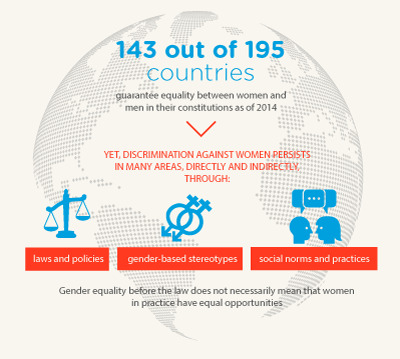
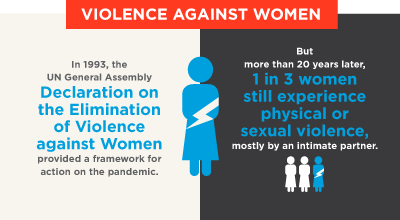
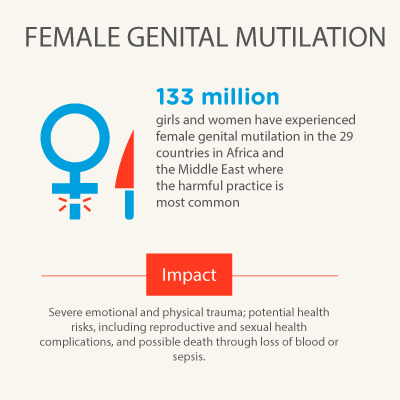
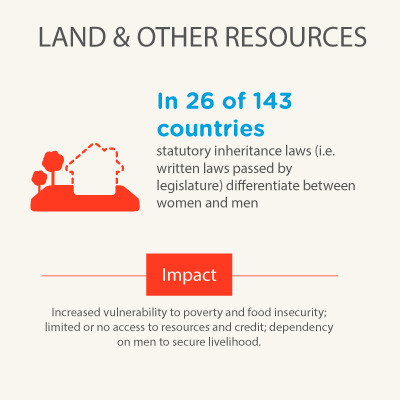
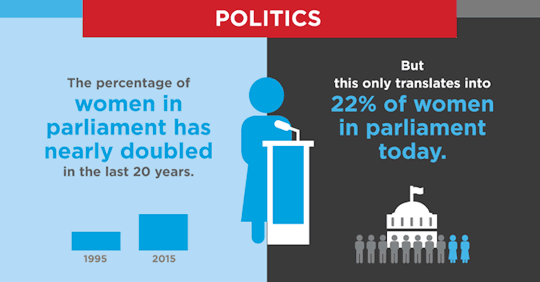
The Future of Women on Women’s Day-UN SDG Goal 5
The target of Goal 5 is to end all forms of discrimination against
all women and girls everywhere.
Eliminate all forms of violence against all women and girls in the public and private spheres, including trafficking and sexual and other types of exploitation.
Women’s empowerment is a pre-condition for this but how far the world is from the target?
Deep legal and legislative changes are needed to ensure women’s rights around the world. While a record 143 countries guaranteed equality between men and women in their Constitutions by 2014, another 52 had not taken this step. In many nations, gender discrimination is still woven through legal and social norms.
Stark gender disparities remain in economic and political realms. While there has been some progress over the decades, on average women in the labour market still earn 24% less than men globally.
As of January 2017, 10 women are serving as Head of State and 9 are serving as Head of Government.
Globally, there are 38 States in which women account for less than 10 per cent of parliamentarians in single or lower houses, as of June 2016, including 4 chambers with no women at all.
Only 22.8% of all national parliamentarians were women as of June 2016, a slow increase from 11.3% in 1995.
What do these mean in reality?
Politically, it depends on the attitude of the head of government. Conservative and dominative political leaders and governments have very few or even no women in their cabinets or key ministerial appointments. Even they have appointed some women, these women may be just some sorts of political vase expected to act as ‘yes’ women to the ideologies of political parties or the leaders rather than having the same authority and/or autonomy in decision making compare to their male counterparts.
Economically, it means a huge breakthrough and shift in paradigm in the social culture is needed to accept women should receive the same remuneration package for same nature of work and same ranking of positions, promotion opportunities in senior management roles. However, even in the more developed economies such as Australia, new data released by the Workplace Gender Equality Agency (WGEA) showed that the percentage of women occupying key management positions are still significantly less than their male counterparts. And that not even taken into account for different gender compositions for different industries. Women received less discretionary pay in the total remuneration package than men.
In terms of recognizing unpaid care and domestic work, it is a dead zone across the world. Women’s efforts of contribution to families are COMPLETELY taken as granted, whether they are mothers, wives, daughters, or caring their families in any capacity.
This means women are left to strive for their own survival on daily basis or up to the mercy of other breadwinners in the families (if there are any) to support them. And that often lead to their vulnerability of domestic violence abuses.
In short term, the resurgence of populists lead governments in certain countries (some of these people may disguise themselves as “conservatives” ) will be a hindrance.
The rising of far-wing ring populists and narrowed based nationalism in certain countries taking conspiracy and suspicious views on foreign NGOs’ will hurt the most vulnerable of the women and girls. For example, in the case of India, certain foreign NGOs are serving people, especially women and girls in the lowest caste providing them opportunities to get out of poverty, receiving education and even have basic opportunities of being literate, hygiene, skills of businesses and how to nurture their infants but under a narrowed based nationalism, certain foreign NGOs may be caught in the midst.
In addition, many NGO’s serving on universal values of humanity base charities will be seen by certain local communities as clashing with and hence threatening their traditional customs and cultures. However, I stay with reasonable optimistic that in longer term societies will recognize the importance of having a fair, just and inclusive society is the KEY to foster peace building and more sustainable developments, not just economic developments but human developments through education and empowering women.
How likely the SDG goal 5 will be fully achieved by 2030?
Certain targets of SDG goals, for example, 5.1 to 5.3 and 5.5 are goals beyond 2030 because the standards are very high and broad from a global perspective. Hence there is an ongoing need for the sustainability of the sustainable goals if we use spiral dynamics theory model to analyze the different development phases and pace of different countries and societies.
The extent of achievement of these goals, even individual goals in individual society and countries depends on how far, how quick and to what extent a society can overcome their own cultural and social barriers. Gender inequalities are the results of beliefs, ideologies, worldviews and value systems that develop on male domination or a submissive, secondary, and dependency about women’s identity and roles in the family and society.
Empowerment of women also means rebuilding the identity and confidence of men from new perspectives
Male dominionism is manifested through strongmen leadership. However, male dominionism also suggests a subtle fragility of men’s identities and their anxiety, fear, frustrations, insecurity in response to rising women identities in a post-modern world as women and girls have more access to education and works. In this sense, to achieve the SDN goals, working to empower women’s identities and capabilities represent only one side of the coin, it is also important to work to enhance a health identity of men about themselves. i.e. the value and identity of a man should NEVER only build on whether they earn more, they are the breadwinner or they hold power OVER women and children or any other person. Men and women are complementary to each other. We are partners rather than master and servants.
In terms of muscular and feminist elements of personal characters, a healthy holistic personal development requires a balanced mixed of both attributes rather than a bi-lateral or dichotomic skewed development.
From a societal perspective, we need both men and women to drive the achievement of this goal if we want to meet all the targets. In fact, not just goal 5 but all sustainability goals. The current reality is that there are disparities in access to political power, economic power, human development opportunities suffered by many women and girls across the world for different reasons. Sustainability can’t be driven by imposing authoritative power on people if through strongmen or strongwomen leadership. The reason is that such leadership style is contradictory to the vision of an inclusive world.
Do women see where and how we are imprisoned by values and norms put to us?
In order to change our future as women, we have to constantly examine and reflects on the narratives that other people or WE- OURSELVES consciously or unconsciously impose onto ourselves. As women, we need to remain open and transformative. Recently, I shared in my fB about my reflection insights about the song House of The Rising Sun. The reason why people are imprisoned and become slaves is because they don’t see they have lost the freedom. If we see we are ‘imprisoned’ by many values that the society attempts to restrain us, we will seek to escape or break through these hurdles. If we don’t see we are these, we will not seek such freedom. The worst part is some people already get accustomed to the comfort zone of the prisons, they VOLUNTARILY stay in the lock-up status. i.e. The MOST impeding factor is the lack of initiative and willful determination and perseverance to break through these cocoons.
Sources:
http://www.unwomen.org/en/news/in-focus/women-and-the-sdgs/sdg-5-gender-equality
http://www.unwomen.org/en/what-we-do/leadership-and-political-participation/facts-and-figures
0 notes